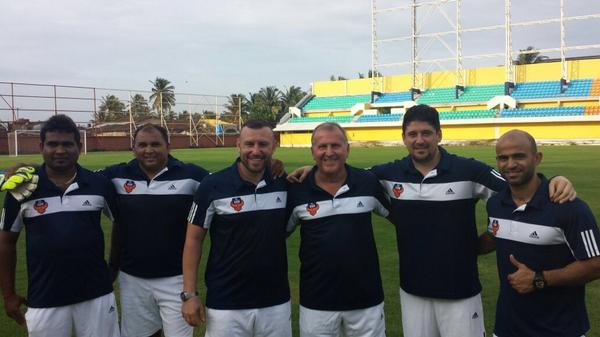Spend a few minutes with Huss Skenderovic and you’ll uncover a wealth of knowledge from the aspiring young Australian coach who has spent the last few years coaching in the United Arab Emirates (UAE) and India.
But cast the clock back just three years, and the then 40-year-old was at the crossroads of his career, following an eventful 12-month coaching period that culminated in his sensational sacking as manager of Oakleigh Cannons.
After being bizarrely dismissed as coach of St Albans Saints in 2011 without coaching a single game, Skenderovic was given the full-time job at Jack Edwards Reserve in 2012 following the departure of good mate Arthur Papas.
Despite the Cannons sitting fourth on the ladder after 10 rounds, a last minute defeat to Northcote saw Skenderovic dismissed after a player revolt from senior figures at the club.
“There was an apparent ultimatum made to the board by a few older players who I was not too keen on keeping on for much longer, and the decision was made to terminate my services rather than theirs,” Skenderovic reflects.
“I’ve been told the same problems marred my successors Peter Zois and Bill Theodoropoulos, and it was only until Miron Bleiberg came in and thought likewise that the board stood up and took notice to rid the club of those senior players.”
First overseas foray
However, the decision by the Cannons hierarchy to terminate his services proved to be a blessing in disguise for Skenderovic, who took a trip into the unknown, accepting an invitation from the UAE to observe their football scene and explore new opportunities. The move paid off for the former Melbourne Knights player, who received his first role in professional football as technical director for UAE Arabian Gulf League club Ajman Club.
What was initially meant to be a one-year odyssey for the Melburnian turned to three, as his contract was extended for a further two years to oversee the entire youth programme at the club.
“My time over in the Emirates was extremely enjoyable, with the stint at Ajman proving to be a fantastic learning process for me,” he says.
“Football in that region is going places and to be a part of that was an incredible experience, particularly at Ajman, which is an ambitious side that does not have as much resources as the powerhouse clubs of Emirati football but always strives to punch above its weight.”
Skenderovic wasn’t the only Aussie based coach in the country, with good friend and fellow Melburnian John Floros joining him in the UAE, with the latter now working as the Under-18 assistant and conditioning coach at Al Nasr of Dubai.
Learning from the best
In addition to the high calibre of foreign players in the league, renowned international coaches have also helped raise the standard of the game in the region.
“While some coaches go over there for a quick and big pay-day, most are motivated by the long-term, highly ambitious project that is underway over there. One coach who has done more than most over there is Albert Benaiges,” he says.
“To be honest, I’d never heard of him before and when it was said he’s worked at Barcelona I didn’t think much of it as many coaches say that without ever working for the Spanish giants in an official capacity.
“But when I had a chat with him and looked him up I realised he was the real deal, as he oversaw the rejuvenation of La Masia Academy and is credited for producing the likes of Xavi, Andres Iniesta, Cesc Fabregas, Gerard Pique and Lionel Messi, whilst having profound football knowledge and expertise.
“I’ve sat down with him on more than once occasion while he was Technical Director at Al Wasl and I was impressed with his views on the game and always by his generosity and humble nature and to me he is somewhat of an idol now.”
The 43 year-old also spent some time recently working in India on the recommendation of Arthur Papas, where he assisted Brazilian legend Zico at Goa alongside the current Oakleigh Cannons mentor in the inaugural Indian Super League (ISL), a spell he describes as “another great football experience”.
“To work alongside the likes of Zico and players such as Robert Pires was a privilege, especially when you look at some of the other names in the league like David Trezeguet, Alessandro Del Piero, Marco Materazzi and Nicolas Anelka,” he says.
“Personally, the only downside about the experience was the exhausting nature of it all, with the constant travelling and hotel stays leaving you basically living out of your suitcase for a few months.”
Comparing Australia with the Gulf
After three years coaching in the Persian Gulf, including a spell assisting the UAE youth representative sides, Skenderovic believes Australia is at risk of falling behind their rivals in the Asian confederation due to the investment poured into football into the region in recent years.
“Similarly to us in Australia, the UAE has restructured its football in terms of youth development and playing philosophy with retaining possession and playing out from the back being the advocated approach,” Skenderovic says.
“However as a whole, there are many differences between the two nations in football terms, with the main one being greater infrastructure and added investment in the game seeing the UAE make rapid improvements over the past few years.
“Stronger youth development structures have strengthened the quality of football, as has the number of big-name foreign signings over the years, who the locals have been able to learn from and improve their own game.”
Skenderovic is therefore quick to cast aside critics of the UAE League, which he believes is better in quality than the A-League, despite the stigma – perpetuated by the media – around Australian players heading there to play.
Over the last few years a number of prominent Socceroos have spent time in the UAE, with the likes of Mark Bresciano, Brett Holman, Matt Spiranovic, Nick Carle, Alex Brosque and most recently Mark Milligan signing on with Arabian Gulf League clubs.
“The standard over there is better, particularly technically and we have seen this to be the case with the failure of Australian clubs, with the exception of the Wanderers last year who to be fair did ride their luck a bit, to perform in the Asian Champions League,” Skenderovic says.
“Most of the Aussies who have gone over there have failed to perform [with the exceptions of Bresciano and Holman] and left soon after they arrived, and that shows you that the quality is high, particularly so in the fact that there is more pressure on the foreigners to perform.”
Concerns about Australian football
With his contract with Ajman coming to end, and his duties in India finished, Skenderovic decided the time was right to return home to family and friends after three years of time spent overseas, despite some interest from Algeria and China.
He has since spent time observing the local football scene, drawing comparisons between the VPL after he left in 2012 and the NPL in 2015.
“I’ve seen a few games now and the quality I must say I expected to be better because as you would think it’s improved since 2012, but then again it might be the case that I have not gone to the best games,” he says.
“Having said that, the infrastructure has improved, but not as rapidly as somewhere like the UAE, where there is money aplenty to spend on it and no rival codes competing for funds and resources.”
Skenderovic believes the A-League has improved significantly since the early days of the competition, but believes a number of barriers still exist that prevent a further increase in the league’s quality.
“Structurally, the absence of promotion/relegation decreases its quality as you had a number of games in the latter end of the last A-League season which were meaningless in the non-existence of such a fundamental system of football worldwide,” he says.
“The imposition of a salary cap also restricts the capabilities of the league in attracting the best overseas players as overseas markets have more money to offer.
“You have to understand that football is a global business competing in a capitalist market where money is of prime importance, and the round ball game is not an exception in the rapidly globalised world arena.
“In the past few years, new emerging markets like the Gulf, Russia, China, the MLS and now even India have opened their wallets and attracted some of the world’s best players who as a whole have improved the standard of football.
“If Australia wants to attract the best possible players, such restrictions imposed by the salary cup need to be limited, restricted or even scrapped as a whole.”
Whilst the former VPL coach enforces that he understands the structural and financial restrictions preventing such measures in Australia, he also believes that the FFA should be open to greater experimentation.
Part of this view extends to the current approach to youth development in football, which he says is too rigid and hinders individual creativity on the pitch. He in turn believes that’s been reflected by the results from Australian youth representative sides and a lack of young players coming through in the A-League.
“Youth development in Australia is very static and robotics-orientated with natural creativity lacking,” he says.
“A forced style of football and formation doesn’t enable creativity and enable youngsters to express themselves in the essence of street football. The importance of teaching youth how to win and develop at the same time is something that working abroad in the UAE has shown me.
“Too often in Australia we think that the two do not go hand-in-hand with development over results the preferred approach in recent years. Thinking in football is a massive ingredient to success, so why eliminate the positive aggression in winning in saying scores don’t matter in youth football?
“When a young footballer loses too many times because of the added focus on playing out from the back and not on where and how we score goals and retain possession in the front third, the brain stops believing and in turn the aggressive nature and natural creative expression of the young footballer diminishes due to a lack of confidence.”
The future
With this mind, it comes as no surprise that the first role Skenderovic has taken up since his return to Melbourne is as a high performance coach with the Australian College of Sport, where he is working alongside Papas and other close colleagues Aaron Symons, Chris Taylor and Shaun Ontong to oversee the next generation of Australian footballing education.
However, his overseas work, combined with a lack of pathways to refine his knowledge at the top levels in Australia, has also left him on the lookout for other opportunities overseas.
“At the moment I’m happy to be back in Melbourne and working with the ACS, but don’t get me wrong, the temptation to move back overseas might prove to be too difficult to resist, particularly with the lack of full-time coaching opportunities here,” Skenderovic says.
Skenderovic’s journey emulates that of many aspiring Australian coaches who have graduated from the state leagues, hindered by a lack of media profile or distinguished playing career to act as a springboard for opportunities at higher levels in Australia. For now, though, he is content with the current path his journey is taking, always seeking ways to further his own education as well.
Images Supplied: @husster_



